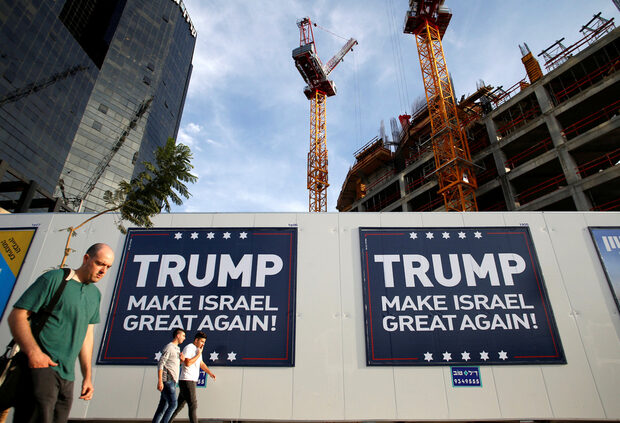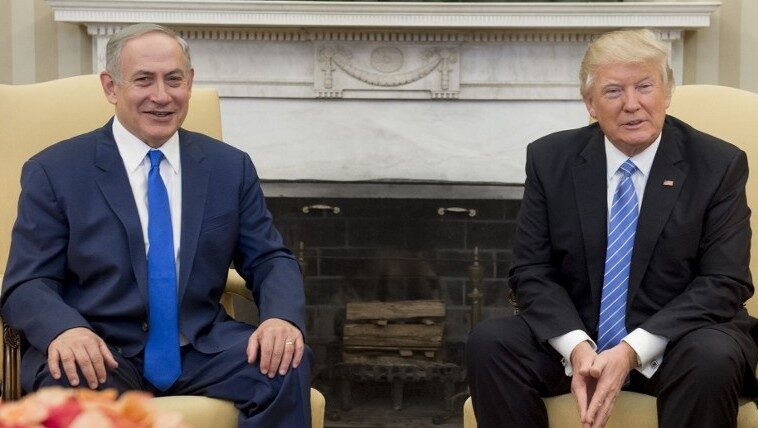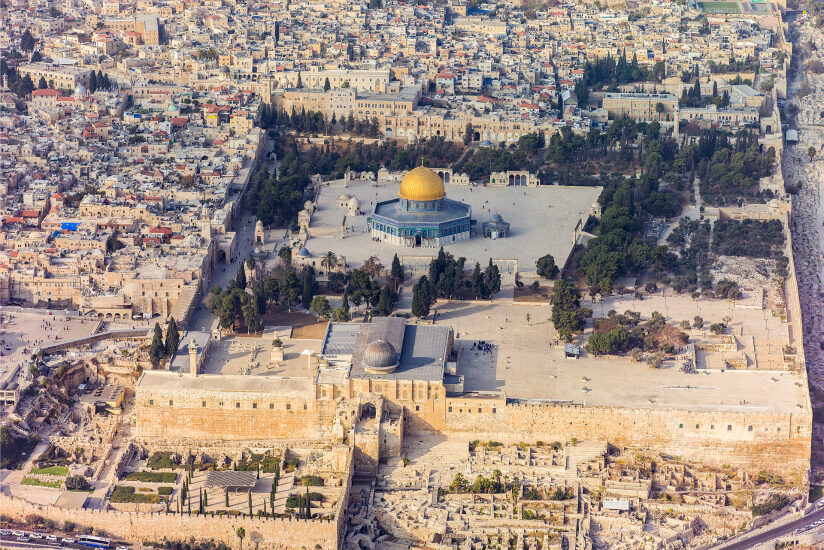DONALD TRUMP AND JERUSALEM

Tel Aviv, November 2016
Jerusalem isn’t only a key issue in a lengthy and often fruitless negotiation. When dealing with the partition of Palestine, Jerusalem is a symbol and, as such, cannot be treated as any other territorial compromise. The United States’s initiative to recognize the city as the capital of the Jewish State will have unpredictable consequences. The assumption that recognizing Jerusalem as the capital of Israel will take the issue off the negotiating table does not take into account the political and religious repercussions of a such a choice. A typical imposed compromise in front of a fait accompli, a typical Israeli PM Benjamin Netanyahu’s strategy in the Occupied Territories, which Donald Trump seems to support. And by supporting the Israeli stance so clearly, Trump has wrecked any potential US role in future talks.
Imbalanced negotiations Donald Trump’s election was supported, among others, by the powerful AIPAC (American Israel Public Affairs Committee) and the US Jewish community. The financing of his electoral campaign was accompanied by the Israeli government’s open support. After being at odds with Barack Obama, Netanyahu now has a friend at the White House. And, in return, Trump has broken with the tradition of (apparent) impartiality and is not a legitimate and super partes broker anymore. It is like asking the Palestinians what they want with a gun pointed at their head. It is hard to believe their expectations, whether legitimate or not, will ever be met. And without a just peace, there is only resentment and terrorism.
The key role played by Trump’s son-in-law, Jared Kushner, who comes from a family of Orthodox Jews, will not help find a fair balance in the negotiations. And if we come to terms with the fact that Israel’s military dominance is indisputable, it is not hard to imagine how prone the Israelis will be to concessions during future talks.

Benjamin Netanyahu and Donald Trump
Neglected ambitions The diverse Palestinian community, either in the diaspora, in the Occupied Territories or in Gaza, has always struggled to find a balance between two differing approaches: the search for a political deal that would lead to the creation of a Palestinian State or war and attacks against Israel. A peaceful negotiated solution means that the expectations of the Palestinians, whether large or small, will be satisfied. At the other end of the spectrum is the “military” or “armed struggle” option. These are two alternative approaches, but every time talks don’t yield any results, more and more Palestinians are open to fighting Israel. For years the Palestinian National Authority (PNA) now led by Mahmoud Abbas has sought a negotiated solution, while bellicose factions such as Hamas and the Islamic Jihad wanted war. Donald Trump’s move has forced the PNA to shift onto more radical positions. Abbas’ policies have not yielded any results, if not the recent deal with Hamas’ leader, Ismail Haniyeh, to allow the return of the PNA to Gaza and to hold elections. But by designating, on January 31, 2018, Haniyeh as a “terrorist”, the US has dealt yet another blow to Palestinian efforts to unify their front. And, as in the recent past, the end result will be that of weakening an already weak Abbas, while boosting the radicals. Recently there were news of an alleged “coordination committee” between Hamas, Hezbollah and al Hashad al Shaabi, respectively Sunni, Shia and Iraqi Shia militias. Although very unlikely, the US policy move is adding fuel to the fire. After all, Jerusalem is a holy city for all the main branches of Islam.
A golden opportunity
The outcome of Trump’s move is the removal of the United States from negotiating the Palestinian stand off. The loss of credibility favors other regional and international actors. It is the case of Russia that, with the Astana talks on the Syrian crisis, has become the strongest broker in the Middle East. It is the case of Turkey that, by exploiting the outrage caused by Trump’s move, passed a resolution at the Organization of Islamic Cooperation that defined East Jerusalem as the capital of the Palestinian state. It was a rare unanimous vote. Recep Tayyip Erdogan wants to lead the Sunnis with his neo-Ottoman policies. Ultimately, also Iran benefited from the move given its historical anti-US and anti-Israeli stances.
Donald Trump’s loss of credibility has reached the entire globe. In December 2017 the UN General Assembly voted against the US decision to move its embassy to Jerusalem. Despite the threats from US ambassador at the UN, 125 countries voted in favor, while only 9 voted against a non-binding motion filed by Turkey and Yemen that preserves Jerusalem’s current status quo.

Jerusalem
Never ending talks The fate of Jerusalem and that of a future Palestinian State have been on the table for decades. A myriad of proposals, suspended and resumed negotiations, wars, Intifadas and varying mediation attempts all share a unique outcome: failure of any negotiated solution. The Palestinians want a state of their own. Israel wants them confined within one or more bantustans. The Israelis seek a reassurance about peace that its counterpart is not capable or, in some cases, willing to concede. During the talks about a two-state solution, Jerusalem has always been a crucial talking point. And it has been one as far back as 1948 when Israel was founded. During a speech at the UN, then Israeli PM Ben Gurion immediately declared that Jerusalem was Israel’s “eternal” capital. And since the 1967 Six Days War and the occupation of East Jerusalem, the Israelis have had full control over the city. With a 1980 basic law, a constitutional amendment, Israel has unilaterally declared that Jerusalem is its “unique and indivisible capital”. A de facto annexation rejected by UN Security Council Resolutions 476/1980 and 478/1980 that declared the measure “null and void” and asked “those States that have established diplomatic missions at Jerusalem to withdraw such missions from the Holy City”. Despite its control over the city, the Israelis have always longed for international recognition and legitimacy for its occupation. Altering the demographics of the Holy City is just another step in that direction. Likud’s Central Committee, the right-wing party is run by PM Netanyahu, approved a document asking for the annexation of Israeli settlements in the West Bank in January 2018. It was a unanimous decision.
Is there a solution?
Jerusalem is at the heart of three monotheistic religions. It is a holy city. This is because Jews pray before the Wailing wall, Christians worship the Holy Sepulchre while Muslims look to the al-Aqsa mosque where Mohamed ascended to heaven. Rather than belonging to a single country or religion, Jerusalem belongs to humanity. UN Resolution 181 of 1947, that was meant to pave the way for a two-state solution and which instead was taken aback by the 1948 Israeli-Arab war after Ben Gurion unilaterally declared Israeli independence, treated Jerusalem as “a corpus separatum under a special international regime and shall be administered by the United Nations”. In hindsight, if respected Resolution 181 would have avoided a 70 year old conflict. 
